KAZNU EXPERTS DISCUSSED THE JANUARY EVENTS
Views: 5102
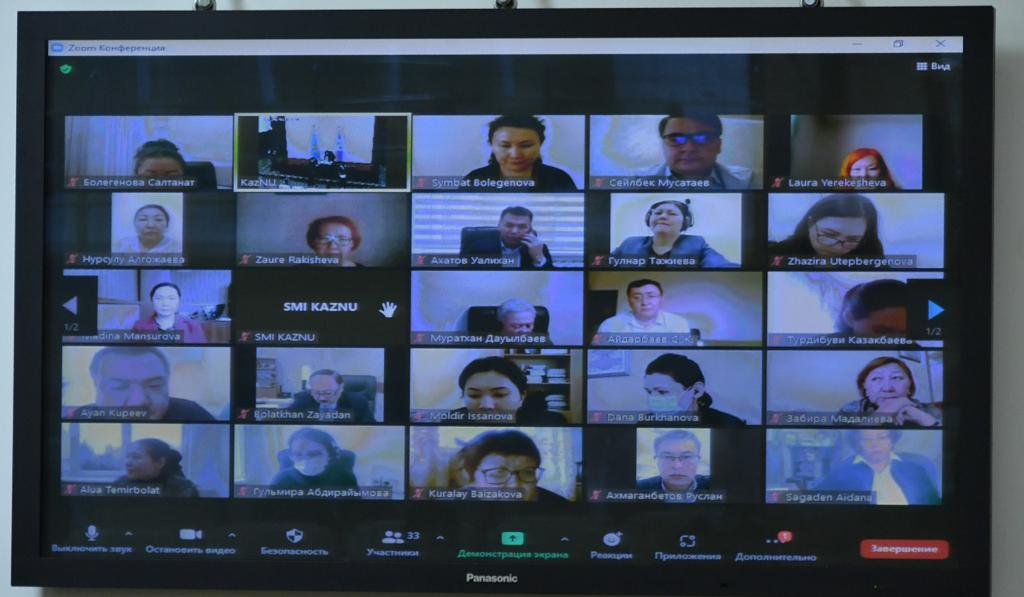
Chairman of the Board - Rector of the Kazakh National University named after Al-Farabi Zhanseit Tuymebayev held a meeting with an expert-analytical group. The meeting, which was held online, was attended by scientists, experts and faculty of the university. The participants discussed the January events in the country, which began on January 2 with peaceful rallies in the Mangistau region on the issue of increasing prices for liquefied gas.
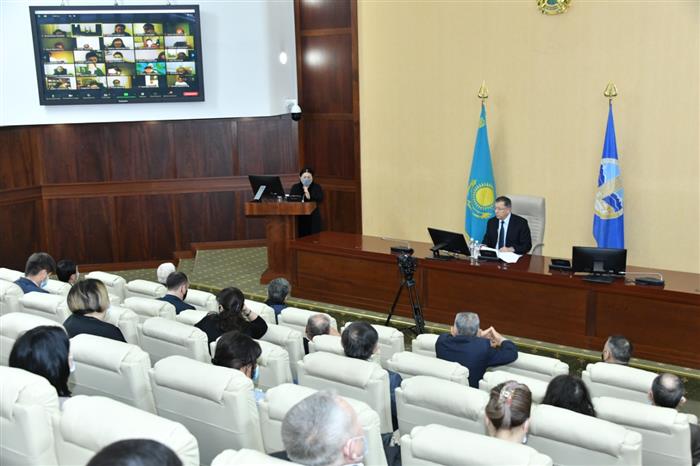
Speaking to the experts, the head of the university focused on the main goal of the meeting and announced specific tasks that President Kassym-Jomart Tokayev outlined in his speech.
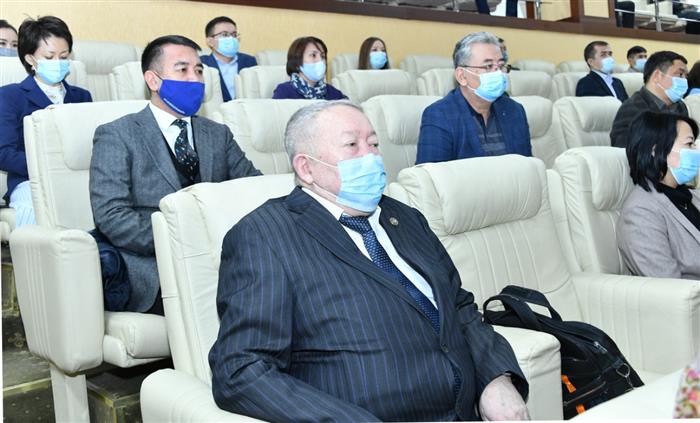
“The main goal of our meeting is a scientifically based analysis of what happened. Identification of the reasons that led to this situation. And most importantly, our recommendations for the further socio-economic and socio-political development of the country. In his speech in Parliament, President Kassym-Jomart Tokayev set specific tasks, such as ensuring full law and order and protecting the rights of citizens, intensifying work to counter religious extremism, terrorism, assisting the development of small and medium-sized businesses, solving socio-economic problems, raising the level of political culture,” said the rector of the university.
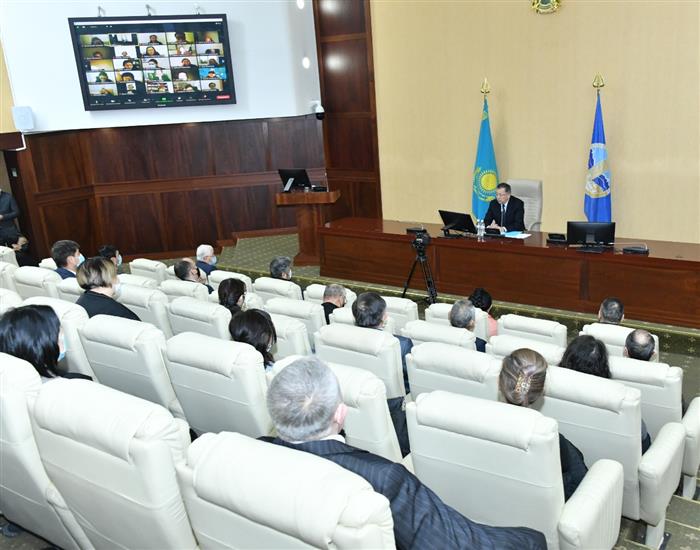
Zhanseit Tuymebaev outlined the main tasks for the experts and gave specific instructions.
1) We need analysis and monitoring, development of specific proposals and recommendations to interested state structures, bodies and special services at various levels (from the local scale to senior staff).
2) Conducting political, sociological, psychological research, focus groups, expert assessments, surveys.
3) Legal assessment, modeling and risk management. Drawing up guidelines, algorithms for the effective organization, application of methods and technologies for holding events of an ideological nature, social and educational work.
4) Research areas: national security, political reforms, geopolitical situation, political culture, political psychology, economics, legal support, hybrid technologies, cybersecurity, social policy, religion and extremism, interethnic relations, etc. As requested and necessary, the range and nature of the subject will expand.
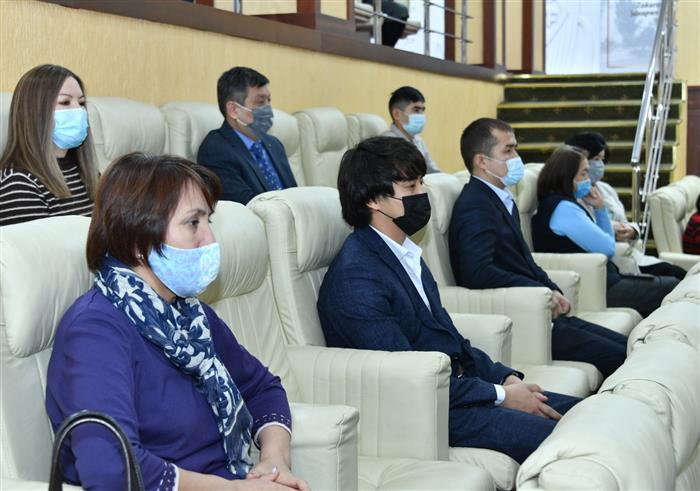
For the implementation of the tasks set, it is required:
- Form expert-analytical groups in areas. Heads of directions - deans of faculties; members of the group - teaching staff of faculties;
- Organize information and explanatory work among students and university staff using modern information and communication technologies (not only informing, but also holding seminars, trainings, coaching sessions);
- Provide all the necessary material, technical, informational, financial resources (in accordance with the requests and requirements of scientific specifications for research).
In addition, the rector of KazNU instructed the experts to prepare analytical materials based on facts and identify the causes of the events that occurred, as well as identify ways to solve them.
During the meeting, the experts spoke and put forward their proposals and recommendations. Among them: Doctor of Law Alua Ibrayeva, Doctor of Political Sciences, Professor Seilbek Musataev, Doctor of Geography Sheripzhan Nadyrov, Professor Amanzhol Kalysh, Doctor of Economics Bolat Mukhamadiev, Professor, Doctor of Law Daulet Baideldinov and Candidate of Philosophical Sciences Bekzhan Meirbaev.
Scientists gave an expert assessment of the January events, which occurred for the first time in the history of the country and shocked the whole of Kazakhstan.
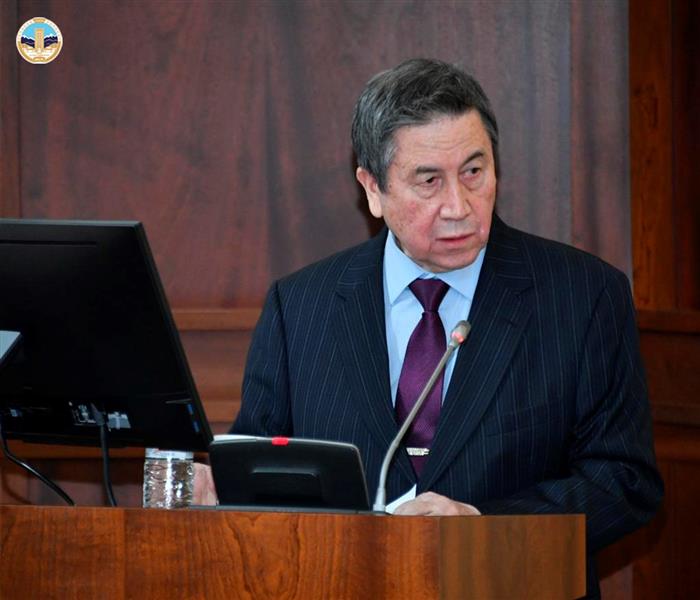
Bolat MUKHAMEDIEV,
Doctor of Economics, Professor of the Department of Economics, KazNU named after Al-Farabi
ECONOMIC REASONS FOR THE JANUARY EVENTS
At the beginning of 2022, events took place in Kazakhstan, the consequences of which no one could have imagined before. They started with rallies of the population in the city of Zhanaozen, Mangistau region, against the deterioration of living conditions. The trigger for these protests was the doubling of the price of gas for refueling cars, from 60 tenge to 120 tenge per liter. It is unlikely that this alone could bring the protesters to the square. There were other more significant reasons for the growing dissatisfaction of the population with the deterioration of living standards not only in the Mangistau region, but also in other regions of Kazakhstan.
Protest speeches were picked up in Almaty and other cities of the country. Of course, as it became clear later, they were not spontaneous. Then the peaceful protesters were joined by looters, as well as terrorists, whose actions were coordinated by someone and their goal was to seize power in Kazakhstan.
Here we will consider the economic reasons that could lead to the emergence of such a protest situation in the country, paying attention to the socio-economic indicators of the western regions of Kazakhstan, primarily the Mangistau region and the city of Almaty.
Real money income of the population and GRP per capita
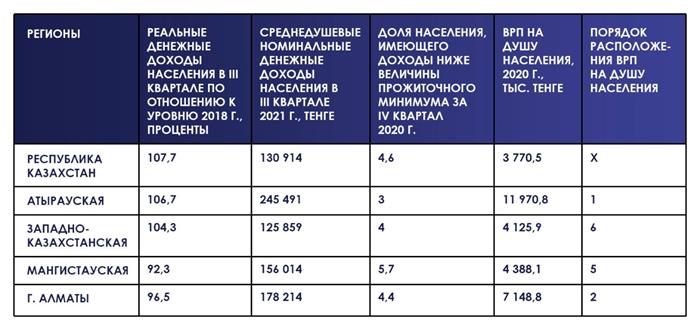
Compiled according to the Bureau of National Statistics of the Agency for Strategic Planning and Reforms of the Republic of Kazakhstan.
It follows from Table 1 that, in general, in Kazakhstan, real money incomes of the population in the third quarter of 2021 compared to 2018 increased by 7.7 percent, in Atyrau region - by 6.7 percent and in the West Kazakhstan region - by 4.3 percent. But in the Mangistau region over the same period there was a decrease in real cash income by 7.7 percent, and in Almaty - by 3.5 percent. This means that on average in the Mangistau region and in Almaty, people could afford to purchase 4-8 percent less goods than 3 years ago. Therefore, it is no coincidence that the protest moods in society were formed to a greater extent in these two regions.
The real incomes of the low-income strata of the population were especially declining. It is in the Mangistau region that the largest share of the population with incomes below the subsistence level is 5.7 percent. And this despite the fact that in the Mangistau region, the gross regional product per capita is higher than its average level in the country. According to this indicator, the Mangistau region is in fifth place in all regions of Kazakhstan.
The growth in nominal income did not cover the rise in prices for basic consumer goods and services. On television, one could observe when correspondents asked people why they went to the rally, they expressed dissatisfaction with the rise in prices.
Consumer Price Index, December 2021 to December 2020
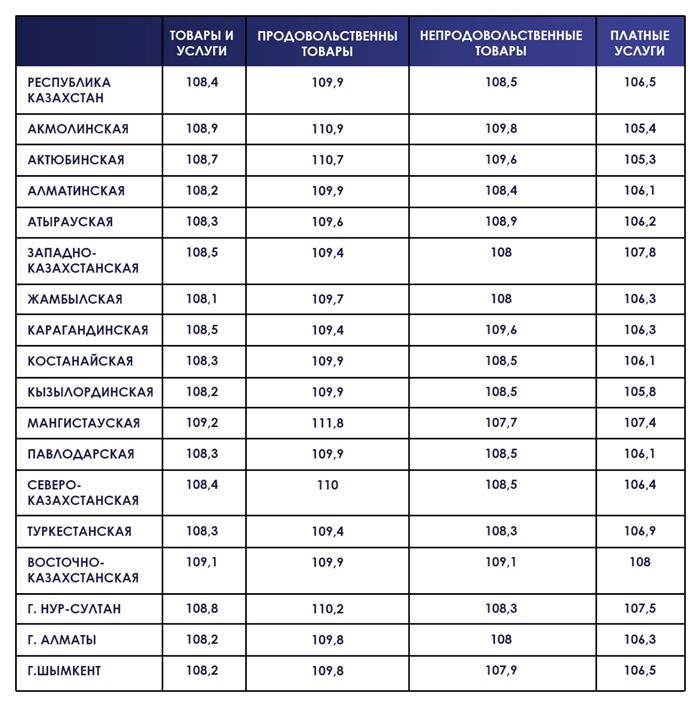
Compiled according to the Bureau of National Statistics of the Agency for Strategic Planning and Reforms of the Republic of Kazakhstan.
Indeed, as shown in Table 2, the increase in the consumer price index for 2021 was the largest for the Mangistau region - by 9.2 percent, and for food products it was also the largest - by 11.8 percent. This means that the population of the Mangistau region suffered more from the increase in food prices than in other regions of the country. The subsistence minimum in the Mangistau region in 2020 amounted to 38,777 tenge. This is the highest value in all regions, and in Kazakhstan the average subsistence minimum was 33,015 tenge.
Despite the measures taken by the government, inflation worsened the well-being of the population. By December 2021, the inflation rate in Kazakhstan amounted to 8.4 percent. Compared to 2020, the inflation rate increased by 0.9 percentage points. The highest inflation rate in 2021 was in the Mangystau region of 9.2 percent, it increased by 1.3 percentage points compared to the previous year.
Inflation in December 2021
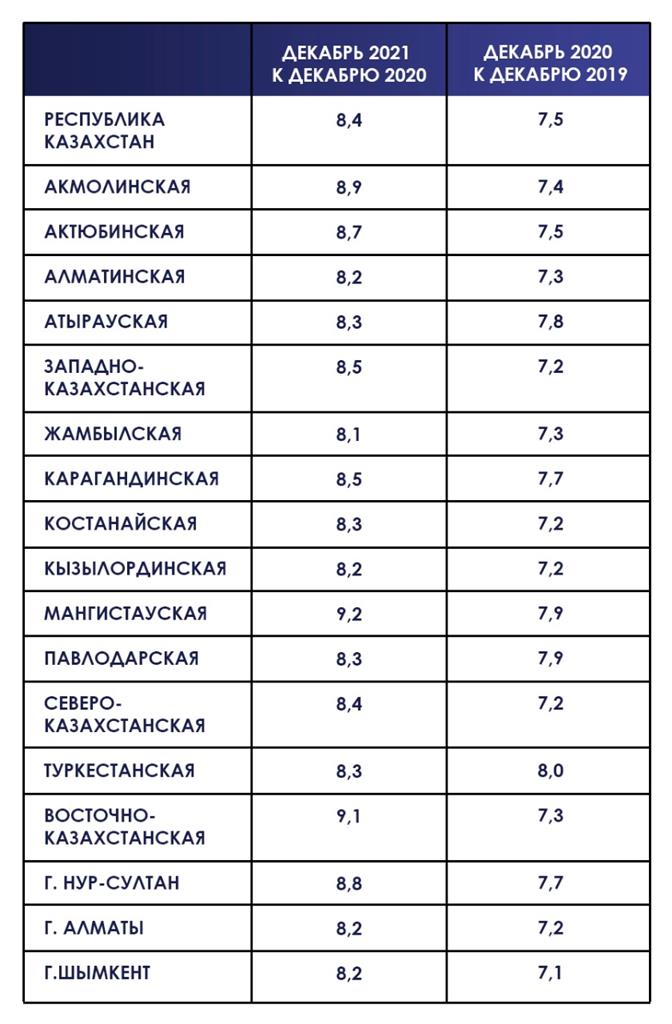
Compiled according to the Bureau of National Statistics of the Agency for Strategic Planning and Reforms of the Republic of Kazakhstan.
Note that in 2021, many countries experienced an increase in inflation rates compared to the previous year: in the United States it was 7 percent, in Russia - 8.4 percent, Turkey - 36 percent, Argentina - 50.9 percent.
Thus, by the end of 2021, in some regions of Kazakhstan, socio-economic conditions have developed for the growth of protest moods among the population. First of all, this applies to the Mangistau region, and in particular, to the city of Zhanaozen, where in early January 2022 people went to the rally. In Kazakhstan's largest city of Almaty, the situation looks slightly better than in Mangistau, however, it has a large segment of the poor, who also have to overcome the hardships of declining real incomes and are prone to protests. They can be used by destructive forces. The above analysis shows that there are objective reasons for the protest moods of the population, and special attention should be paid to improving the socio-economic conditions in the Mangistau region and in some other regions of the country.
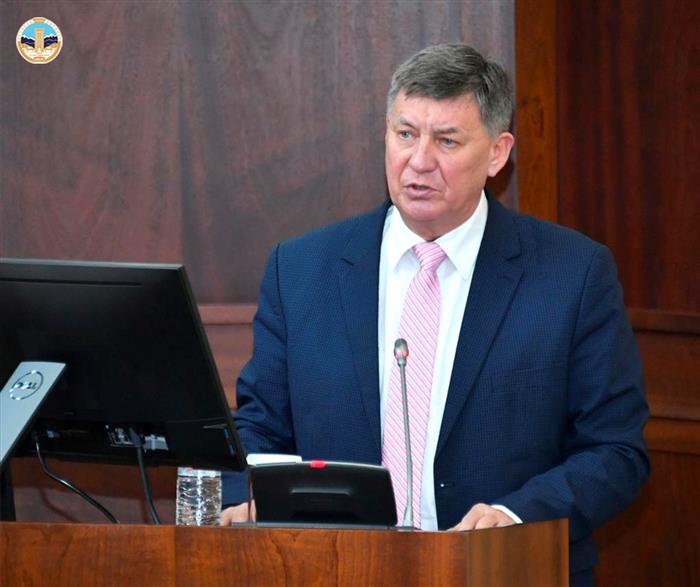
Daulet BAYDELDINOV,
Professor, Dean of the Faculty of Law of KazNU named after Al-Farabi
THE DEATH PENALTY SHOULD BE RE-RESTORED
- Alive, armed militants are still in our city, in apartments and houses with food supplies. The threat of terrorist attacks in our city remains, and it is very high. These are not grim facts, but a reality for which we must be prepared. Our expert opinions must be long-term. Very short, real recommendations are required, the people are waiting for decisive action.
For me, as a lawyer, for example, it is significant that in December the President signed an order to abolish the death penalty in the Republic of Kazakhstan. On January 9, I spoke with the media and clearly outlined my position on this issue. First of all, not for the citizens of the Republic of Kazakhstan, but for professional terrorists, the death penalty should be restored.
These are invaders, enemies, not our citizens, who share their pain in an attempt to solve socio-economic issues. I want to say that we, each in our area, know and see the problems of our state. Legal issues are always just the tip of the iceberg. And the underlying processes are much more serious. At the moment, we, experts and leaders, require specific plans, steps and actions for the coming year. The problem has not gone away, it is acute and needs to be addressed.
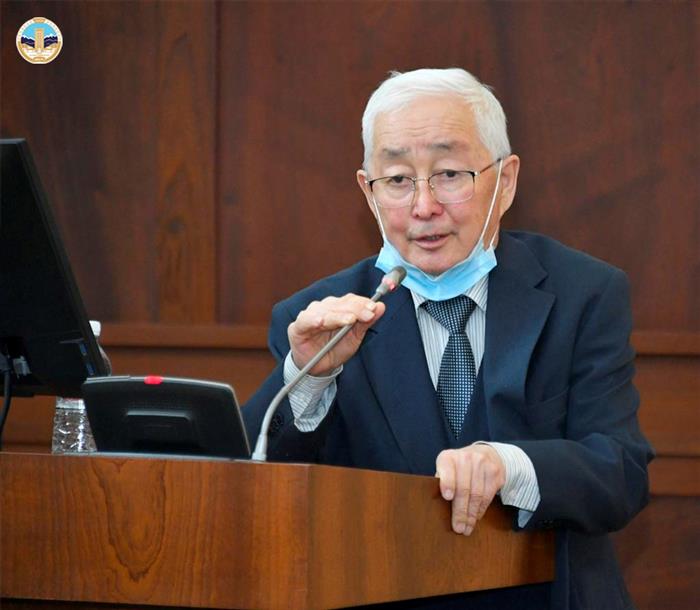
Sheripzhan NADYROV
doctor of geographical sciences, professor
GEOECONOMIC REASONS
What caused the terrible January events? Superposition of internal conflicts, contradictions, mistakes in socio-economic development for external, geopolitical reasons. Whatever the internal factors, every high-profile event in the most remote point of the globe, in any state will certainly attract the attention of geopolitical players around the world.
Of course, we are now reaping mistakes, but the point is not to talk about them, but to look for opportunities and ways to correct them.
As a geographer, I will say that there has been a great deformation in the spatial organization of the population. Uneven settlement, its concentration in agglomerations, where, along with services and technologies, a large amount of crime is concentrated, the pulling of the “economic blanket” into certain regions of the country, when most of it remains bare, all this could not but lead to sad consequences. The weak ideological component in the education system also had an effect.
Measures to eliminate the consequences and correct the situation in the country should, for the most part, be of an intellectual nature. This means that Kazakhstan must integrate into new technological, innovative chains in order for the country's population to breathe freely.
Today there are resources that will make it possible to correct the situation and quickly forget this day. To do this, you first need to work.
Press service of Al-Farabi KazNU








